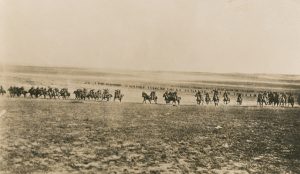
In modern times, the event is commemorated annually, on the 31st of October, as the Battle of Beersheba Day.
For a brief essay about the battle, see: The Battle of Beersheba (1917).
For some information about the famous photograph, see: The charge of the Australian Light Horse at the Battle of Beersheba.
Articles about the Battle of Beersheba:
Various articles relating to the Battle of Beersheba (1917).
(Arranged in chronological order.)
Australian Light Horse engaged [15 November 1917]
Some details from a despatch, from Lieutenant-General Sir Edmund Allenby, regarding the Allied military operations in Palestine.
Our Light Horse regiments [15 November 1917]
An article regarding the Australian Light Horse in Palestine.
Taking Beersheba: Advance in the desert: Roman wells prove useful [letter, 20 January 1918]
A letter, written by an unknown Army officer, regarding the Battle of Beersheba.
Capture of Beersheba: A real Australian charge: Graphic details from Trooper French [World War One letters, 11 February 1918]
Three letters, written by Trooper J. R. French, who recounts his part in Battle of Beersheba.
Capture of Beersheba: Queensland soldier’s experiences [letter from Victor Brady, 15 February 1918]
A letter, written by Trooper Victor Neville Brady, regarding the Battle of Beersheba.
Not in the text books: How Light Horse fought in capture of Beersheba: Turks’ debacle pictured by Australian trooper [by J. C. Ryan, 16 February 1918]
A letter, written by Trooper J. C. Ryan, regarding the Battle of Beersheba.
Capture of Beersheba: Australians’ great charge: Sydney sailing enthusiast’s letter [letter from Trooper Wal. Keddie, 21 February 1918]
A letter, written by Trooper Wal Keddie, regarding the Battle of Beersheba.
Fall of Beersheba: Charge of the —— Regiment: How Anzacs fight: The sight of a century [letter from Trooper Tom Latimer, 23 February 1918]
A letter, written by Trooper Tom Latimer, regarding the Battle of Beersheba.
Australian Light Horse: At capture of Beersheba [10 April 1918]
A letter, written by an unknown member of the Australian Light Horse, regarding his experiences at the Battle of Beersheba.
Beersheba [poem by Trooper A. Beatty, 21 September 1918]
A poem, by Trooper A. Beatty, regarding the Battle of Beersheba.
Capture of Beersheba, Oct. 31 [report by General Sir Edmund H. H. Allenby, 1919]
An extract, regarding the Battle of Beersheba, taken from the despatches from Sir Edmund Allenby (a British general) to the UK’s Secretary of State for War. Also includes a map of the Palestine campaign area, with some accompanying text.
“Australia in Palestine” [book review, 6 November 1919]
A review of the book Australia in Palestine (1919).
Battle Diary: Light Horse at Beersheba [31 October 1921]
A short article, regarding the Battle of Beersheba.
Charge at Beersheba [8 November 1921]
A short article, regarding “a remarkable photograph of the famous charge by the Australian Light Horse at Beersheba” included in an exhibition of war pictures at the Prahran town hall.
Anzacs’ achievements: Cavalry and Flying Corps eulogized: Lord Allenby’s tribute [13 January 1926]
An article about the visit of Lord Allenby to Melbourne in 1926, which gives some details about Battle of Beersheba (Edmund Allenby was the British general in charge of the Allied war effort in Palestine, including Beersheba).
Beersheba [by Cyril Smith, 1 November 1934]
An article by Captain Cyril Smith, of the Australian Light Horse, regarding the Battle of Beersheba.
“Film is world-wide inspiration” [movie review, 25 January 1941]
A review of the Australian war movie “Forty Thousand Horsemen” (1940). The film was about some Australian Light Horsemen and their adventures in the Middle East during the First World War (1914-1918); it included some scenes involving the Battle of Beersheba (1917).]
Leave a Reply